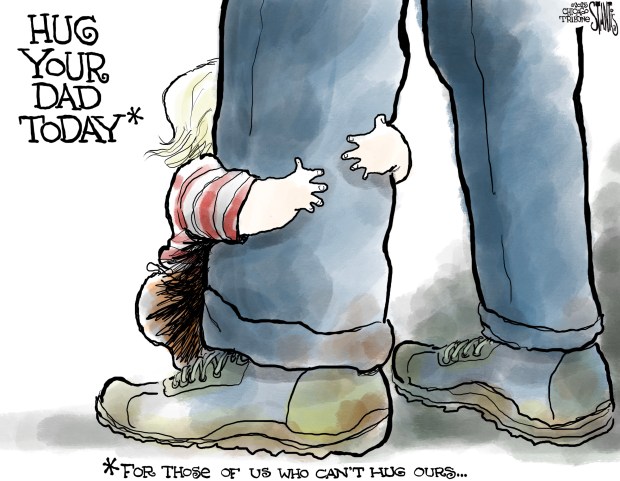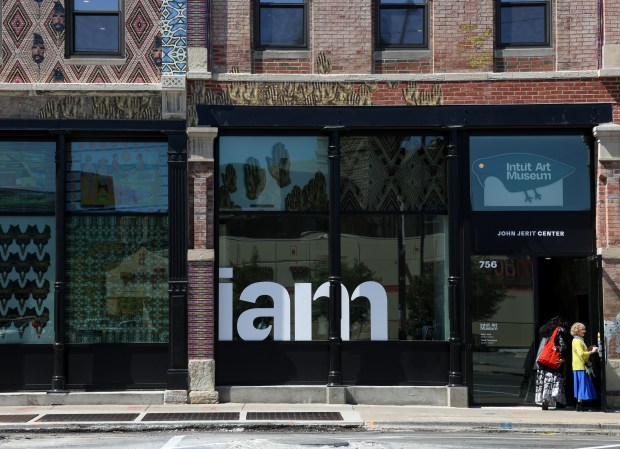I came to Chicago from northwest Indiana with a soft belly, so to speak. Not naive but hopelessly earnest. I’ve spent 12 years living and working in this crowded, noisy and, at times, intimidating place, and it hasn’t taken away my softness. But I’ve been the worst version of myself — as well as the best version of myself — here.
I’ve encountered harshness and indifference, and I’ve given those things in return at times, I’m ashamed to admit. But I’ve also seen unwavering civility and a persistent desire in strangers to be helpful and humane — in all parts of the city.
My late mother would call these moments acts of grace. She taught me the supreme importance of sowing grace, or goodwill, even when the vicissitudes of life and other people threaten to turn us mean.
Here’s a quiet truth about grace. It tends to inspire the same. Even in the big, bad city. Let me illustrate.
On a day off some years ago, I was walking toward the French Market in the West Loop to meet my sister for lunch when I came across a woman in her late 50s, Eloise, who was laboring hard to haul an impossibly stuffed suitcase and two heavy boxes stacked in a collapsible shopping cart. She was on her way to take a train out West to be with her brother, I learned. I had plenty of time to get where I was going, so I offered a hand and took over pulling the cart.
At one point, Eloise’s suitcase got caught on some rough pavement as the light turned red at an intersection. But I didn’t have to run back to help. Two young professionals clearly on their lunch break swooped in like superheroes. We were still several blocks from Union Station, but those men carried Eloise’s suitcase all the way there. At baggage check inside the station, I told the men they did a fine thing. Eloise beamed as we bid her goodbye, and I walked away hoping that we had left her with the best possible memory as she parted ways with Chicago.
Now let me tell you about a wave of kindness I got to witness in an unlikely place: a CTA bus in the thick of rush hour.
There are a few rules that most public transportation riders follow: Keep to yourself and watch for your stop. And try to be mindful of others who might need a seat more than you. But that last part can be a stretch for people, especially during rush hour.
Back when my colleagues and I worked out of Tribune Tower, I finished my shift one day during rush hour and boarded the Chicago Avenue bus to where home was at the time. I got a seat up front, and the bus quickly filled to capacity. I only passingly noted the mother and her 20-something daughter standing near me. Then the bus jerked to a stop, and I saw the daughter take it really hard. I noticed that she had developmental disabilities, and I realized her getting a seat was a priority. At the next stop, I was about to offer her my seat when a seat near me freed up and her mother ushered her over.
The mother appeared to be stretched beyond her limit, and so I waved her over and asked her if she’d like my seat to be near her daughter. She replied flatly, “Yes,” and slid past me to sit down.
I then found a spot nearby where I could stand as the bus continued to lurch its way to my neighborhood.
A few bus stops later, I felt someone rapidly pat me on the middle of my back. When I turned, I saw the mother leaning toward me and motioning at my old seat. She was now sitting next to her daughter, and her face was soft and joyful as she delivered the good news about my old seat. I was about to sit down when I saw an older woman hovering nearby. I nodded her in the direction of the seat.
Then at the next stop, a man standing near me who had been watching the whole time immediately pointed out a seat when it opened up. It was a tag team effort. I sat down.
Finally, there is Pete. I didn’t know him, and I had only a few brief interactions with him, but when he died early this year, I discovered just how much grace Pete had inspired in my neighbors. He was unhoused and lived between Athletic Field Park and the Addison Blue Line station in an ice fishing tent that was gifted to him. Neighbors gave him food and clothing, and from what I could gather from a community Facebook page after his death, they didn’t treat his situation as the result of a personal moral failing, a common knee-jerk reaction to homelessness.
The community recognized Pete’s humanity, and his death sent ripples through it. Now, raised-bed gardens and a Chicago flag design woven into a chain-link fence mark with reverence the plot where he lived his last years.
What I’ve learned is that when we act with grace, we give voice to the profound parts of ourselves, and, equally important, we signal to other people that it’s safe to be gentle and giving, too.
We desperately need to be soft. Because that is our true nature, even in the big, bad city.
Colleen Kujawa is a content editor who works with the Tribune Editorial Board.
Submit a letter, of no more than 400 words, to the editor here or email letters@chicagotribune.com.




